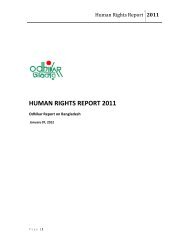Please - Odhikar
Please - Odhikar
Please - Odhikar
Create successful ePaper yourself
Turn your PDF publications into a flip-book with our unique Google optimized e-Paper software.
subjected to arbitrary interference with his privacy, family, home or correspondence, nor to<br />
attacks upon his honor and reputation". Everyone has the right to the protection of the law<br />
against such interference or attacks.<br />
When should protection be given?<br />
Generally, victims and witnesses need to be provided with continuous protection in three stages<br />
of prosecution:<br />
Investigation/pre-trial stage<br />
Immediately after an offence is caused, victims and witnesses need protection. They may be<br />
passing a traumatic stage, which is a vulnerable time for them. An offender may have a<br />
continued grudge against victims or may develop a new grudge against witnesses. This phase<br />
starts with the making of a first information report and ends with the filing of a charge sheet. The<br />
act of filing a charge-sheet may anger the perpetrator of the crime, who has been intimidating the<br />
victim and witnesses in order to make them stop proceeding with the matter. This stage is crucial<br />
because police try to unearth facts and evidence during pre-trial/investigation stage. Physical<br />
security and psychological counseling for the victim and also for witnesses are essential during<br />
this time. Preventive measures need to be taken to check recurrence of offence.<br />
Trial stage<br />
During this stage, facts and supporting evidence are produced in court and victims and witnesses<br />
participate in the prosecution. To thwart the trial process, the offender may try to bar the<br />
participation of victims and witnesses. Security of victims and witnesses is important to protect<br />
them from other obstructions of trial. In case of non-bailable offences, the under trial<br />
offender/accused is put in jail, which is a protective measure for victims and witnesses. But<br />
accomplices of behind-the-bar offenders/accused might cause further harm to victims and<br />
witnesses during the trial period.<br />
Post-trial stage<br />
This stage is comparatively less dangerous for victims and witnesses than the other two stages.<br />
However, this period is not totally risk free. A convict may, out of vengeance, attempt to cause<br />
further harm to victims and witnesses either directly or through accomplices. So protective<br />
measures for victims and witnesses need to continue up to a certain period of time after the trial<br />
ends. Repatriation and rehabilitation are also part of post-trial protection of victims and<br />
witnesses.<br />
How to ensure protection for victims and witnesses<br />
A political State has three organs in executive, legislature and judiciary. Responsibility for<br />
ensuring protection to victims and witnesses lie with all these organs.<br />
Role of the Legislature<br />
Bangladesh does not have any specific distinct legislation to provide protection to victims and<br />
witnesses. A few criminal laws have inadequate provisions to provide protection to witnesses,<br />
but not to victims. In the background of the increasing number and diversified kinds of crimes,<br />
victim and witness protection legislation needs to be enacted urgently. Many of the rural people,<br />
152<br />
Report 2005











